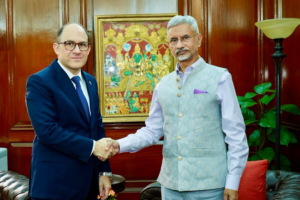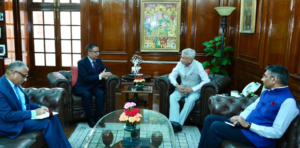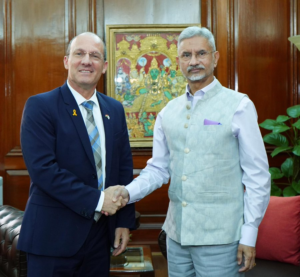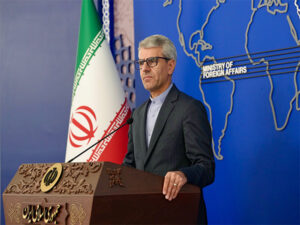PHDCCI International Week kicks off, with focus on ‘Unleashing innovation, collaboration, global impact’
New Delhi [India], March 14 (ANI): The PHD Chamber of Commerce and Industry (PHDCCI) International Week has begun with the second day of session focusing on unleashing innovation and collaboration.
The second day of the PHDCCI International Week saw an invigorating exchange of ideas, fostering a dynamic atmosphere of innovation and collaboration among global leaders, experts, and delegates.
The session titled “Empowering Tomorrow: Unleashing Innovation, Collaboration, and Global Impact on Day 2 of PHDCCI International Week – Where Vision Meets Action” took place on March 13 (Wednesday), where all the delegates exchanged ideas and experiences that had set the stage for transformative actions which will positively impact economies and societies.
Uzbekistan Ambassador to India, Sardor Rustambaev highlighted that in the six years that India and Uzbekistan have been trading and cooperating economically, significant progress has been made in several areas.
Both countries have shown a dedication to a multifarious collaboration that goes beyond economic gains to include breakthroughs in education, technology, and industry, in the areas of mutual interest including medicines, hotel management, education, and textiles.
Daniiar Syrdybaev, Minister Counsellor, Embassy of the Kyrgyz Republic, India emphasised that significant efforts have been made by both India and the CIS nations to forge meaningful connections, notably in the areas of technology and logistics.
“The convergence of these domains signifies a mutual understanding of the significance of technology innovations and efficient logistics in promoting economic expansion and cooperation,” an official statement said.
Moreover, modern technology combined with effective logistics creates a bridge that improves trade, makes transactions easier, and fortifies overall economic relations between the countries.
Notably, both parties are open to business potential in this situation. The statement added that the welcoming gestures shown to Indian companies indicate a desire to promote business alliances and build on one another’s advantages.
“This openness highlights the possibility of mutual gain because India’s technological expertise and dynamic economy complement the opportunities and resources offered by the CIS nations, added Mr Daniiar,” the statement read.
Azat Serikbossyn, Deputy Head of Mission, Assembly of the Republic of Kazakhstan, said that the excellent and mutually beneficial relations between Kazakhstan and India have been largely fostered by their spirit of friendship.
Moreover, this unity has resulted in significant growth in significant industries, both in terms of quantity and quality.
They further noted the substantial advancement in manufacturing, especially in important areas like food, chemicals, and machine building.
The increase in output is a reflection of both countries’ dedication to economic growth and mutual benefit. Additionally, improvements in the calibre of products and services highlighted a shared commitment to fulfilling global standards and meeting customer expectations.
The active involvement of numerous Indian multinational corporations in conducting business in Kazakhstan is a notable aspect of this cooperative endeavour.
These businesses, contributing knowledge, creativity, and investment, have been crucial in shaping Kazakhstan’s economic environment.
The involvement of Indian multinational companies highlighted the breadth of economic cooperation and is a sign of confidence in Kazakhstan’s business environment.
Additionally, the robust camaraderie among people has created the groundwork for significant increases in output, with an emphasis on improving the calibre and volume of products and services.
“A prosperous and cordial cooperation exists between Kazakhstan and India thanks to the active participation of multinational corporations from India, which further strengthens the breadth of economic links,” the statement read.
Elchin Nariman Oglu Huseynli, Ambassador, Embassy of the Republic of Azerbaijan highlighted that the two countries work together in areas, including, trade, tourism, and medical cooperation.
This complex partnership puts a strong emphasis on a shared prosperity pledge and the sharing of knowledge and resources. Moreover, the synergies produced by this kind of cooperation promote interpersonal relationships and cultural understanding in addition to economic growth.
Notably, India is the tenth-largest economic partner, demonstrating the breadth and importance of its economic cooperation.
India’s rank reflected the significant investment and trade flows that exist between the two nations, further establishing their status as important players in the world economy.
The partnership’s dynamic nature is further highlighted by the opening of fresh investment opportunities.
Elchin added that the openness to accepting fresh works and promoting investments is indicative of both countries’ forward-thinking perspectives.
The statement read, “As the PHDCCI International Week progresses, we remain dedicated to providing a platform that transcends geographical boundaries, fostering collaboration and innovation on a global scale.”
Later during the second session, Steven De Wilde, Deputy Head of Mission, Embassy of Belgium in India stressed that India’s standing on the world stage has greatly improved, especially in the areas of research and development.
It is now at the forefront of worldwide competitiveness owing to its dedication to promoting innovation and technological developments. India’s persistent culture of win-win competition, which promotes cooperation and mutual benefit with other countries, is an example of this trend.
Renewable resources and green energy are two notable areas where India has advanced significantly. The nation has become the world’s fourth-largest generator of wind energy, demonstrating its commitment to ecologically responsible methods and solutions.
“In addition to establishing India as a major force in the global energy scene, this accomplishment highlights India’s dedication to combating climate change and advancing a more sustainable, cleaner future,” it added.
Notably, India and Belgium have worked together to create a dynamic synergy, each using its own capabilities to advance the other.
Belgium has become a research and development powerhouse, making substantial contributions to the growth of technology. Meanwhile, India has demonstrated its strength in the healthcare industry by securing its position as the world’s biggest producer of vaccinations.
“A crucial component of bilateral collaboration has been the integration of information technology (IT), as Belgium depends more and more on India’s IT industries. This mutual reliance has advanced both countries in the rapidly changing digital sphere while also fortifying bilateral relations,” it stated.
Ambassador of Slovenia to India, Mateja Vodeb Ghosh said that Slovenia has excellent conditions for business and investment, with development prospects and stability.
Recognizing foreign investment’s ability to improve and diversify the nation’s economic environment, the nation has actively pursued it.
“Thus, the inflow of foreign investment creates new opportunities for international investors in addition to boosting the nation’s economic development,” it stated.
Slovenia is a country with a highly skilled and productive labour force. Moreover, the nation has invested in education and skill development, producing a workforce that is both skilled and flexible enough to meet changing industry demands.
Leading to this, human capital offers a strong basis for efficiency and creativity, making it a desirable asset for companies thinking about investing in Slovenia.
For investors seeking to investigate and take advantage of investment opportunities, Slovenia is an appealing option because of its safety record, highly skilled workforce, and friendly business environment, Mateja Vodeb Ghosh added.
Ambassador of Estonia to India, Marje Luup highlighted that Estonia, known for its technological creativity and prowess, has cemented its place as a major global IT powerhouse.
“Promising potential arises from the synergy between Estonia and India, especially in the areas of food and beverage production, military, and green energy solutions,” she said.
She added that both countries may take advantage of their unique advantages to tackle urgent global issues.
“Collaboration in the field of green energy could result in creative and long-lasting solutions, supporting international efforts to tackle climate change,” Luup said.
Moreover, she emphasised that joint projects could improve technology and security protocols in the defence industry, resulting in a stronger defence alliance.
She said that collaboration in the food and beverage sector also presents opportunities for shared invention, economic development, and the sharing of culinary customs.
Given their common principles of innovation, transparency, and a global outlook, both countries are ideal allies for tackling today’s issues and creating new opportunities in a range of industries.
Reuben Gauci, High Commissioner of Malta High Commission, India said that the pharmaceutical industry’s active relationship between Malta and India is a calculated effort meant to maximize the advantages of this partnership.
The ease of conducting business in Malta is further enhanced by the lack of linguistic obstacles.
“The linguistic harmony between Maltese and Indian stakeholders facilitates communication and collaboration, hence augmenting the efficacy and triumph of the pharmaceutical alliance,” Gauci said.
The pharmaceutical collaboration between Malta and India essentially takes advantage of Malta’s EU membership, linguistic compatibility, and highly qualified workforce to strategically build a production hub that can cater to the large European market.
This joint venture has put both countries in a strong position to prosper in the ever-changing and cutthroat pharmaceutical industry, Reuben added.
Martine Aamdal Bottheim, Deputy Chief of Mission and Minister Counsellor at the Royal Norwegian Embassy in India, stated that there are countless opportunities between both nations, offering a game-changing chance to double commerce between the two countries.
This audacious objective demonstrates a common dedication to developing profitable alliances and strengthening economic connections across a range of industries, she said.
Norway and India are both prepared to work together to support the international effort to address climate change because they understand the value of environmental care.
“The collaboration has the potential to accelerate green technology developments and benefit economies and the environment by exchanging information, technology, and sustainable practices,” Martine added.
Essentially, the elaborate cooperation between Norway and India emphasizes a commitment to mutually beneficial collaborations and sustainable development, in addition to the goal of doubling trade.
This alliance has placed both countries at the forefront of international economic and environmental activities by symbolizing a convergence of capabilities and goals, Martine said.
Vijay Sheoran, Co-Chair, of the International Affairs Committee for Europe & CIS, PHDCCI, highlighted the close cultural and economic relations shared by India and European countries.
He further stressed the various sectors of cooperation like Health and Wellness, Technology transfer, manufacturing, education, and tourism amongst many others where both India and Europe have been closely cooperating.






